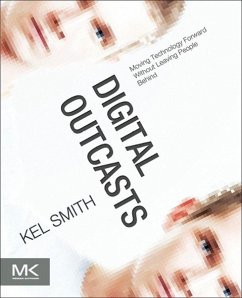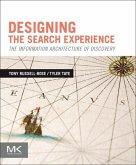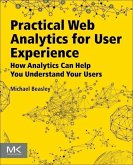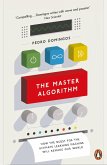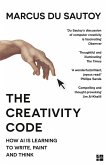The blind person who tries to make an online purchase. The young girl who cannot speak due to a cognitive disability. The man confined to his home due to permanent injury. The single mother with a long-term illness who struggles to feed her family.
With one in seven people worldwide currently living with a disability, the term "outcast" covers numerous scenarios. Digital outcasts rely on technology for everyday services that many people take for granted. However, poorly designed products risk alienating this important (and growing) population.
Through a "grass roots" approach to innovation, digital outcasts are gradually taking action to transform their lives and communities. This emerging trend provides exciting learning opportunities for all of us.Citing real-world case studies from healthcare to social science, this book examines the emerging legal and cultural impact of inclusive design.
Gain a better understanding of how people with disabilities use technology Discover pitfalls and approaches to help you stay current in your UX practices Anticipate a future in which ambient benefit can be achieved for people of all abilities and backgrounds
With one in seven people worldwide currently living with a disability, the term "outcast" covers numerous scenarios. Digital outcasts rely on technology for everyday services that many people take for granted. However, poorly designed products risk alienating this important (and growing) population.
Through a "grass roots" approach to innovation, digital outcasts are gradually taking action to transform their lives and communities. This emerging trend provides exciting learning opportunities for all of us.Citing real-world case studies from healthcare to social science, this book examines the emerging legal and cultural impact of inclusive design.
Gain a better understanding of how people with disabilities use technology Discover pitfalls and approaches to help you stay current in your UX practices Anticipate a future in which ambient benefit can be achieved for people of all abilities and backgrounds
"The intended reader is anyone attempting to either create more accessible technology for use by the disabled, or has an interest in novel ways that things like virtual reality, computer games, and assistive devices can be used in medicine to treat a variety of disabilities and assist in patient rehabilitation. The book concludes with a series of chapters on socially and environmentally responsible design and thinking ahead to the future in which digital devices will become ever more integrated into daily life and even the human body itself." --Reference & Research Book News, December 2013
"Kel Smith makes a significant contribution to the subject of user experience in this easily read but important treatise. the book makes a compelling case for universal design, a concept far more expansive than the more common notion of handicapped-accessible technology.The information here will be challenging and profitable, not only for designers but also for anyone associated with advancing computer technology." --ComputingReviews.com, November 13, 2013
"The book provides a detailed overview of how people with disabilities use technology. More importantly, it shows that creating effective user interfaces for those with disabilities is beneficial for all users.Smith writes that for accessibility to work, it has to be an enterprise initiative. He provides 8 strategic steps to doing that.This book is an important read for everyone." --Slashdot.org, November 25, 2013
"This is a wise book that accepts that disability, like ability, is abounding with nuances and variation, and Smith admits that it is behaviour that has to be focused upon rather than any device.Smith draws this excellent book to a close with the ethics surrounding the technology, along with current and future developments." --BCS online, November 2013
"Kel Smith makes a significant contribution to the subject of user experience in this easily read but important treatise. the book makes a compelling case for universal design, a concept far more expansive than the more common notion of handicapped-accessible technology.The information here will be challenging and profitable, not only for designers but also for anyone associated with advancing computer technology." --ComputingReviews.com, November 13, 2013
"The book provides a detailed overview of how people with disabilities use technology. More importantly, it shows that creating effective user interfaces for those with disabilities is beneficial for all users.Smith writes that for accessibility to work, it has to be an enterprise initiative. He provides 8 strategic steps to doing that.This book is an important read for everyone." --Slashdot.org, November 25, 2013
"This is a wise book that accepts that disability, like ability, is abounding with nuances and variation, and Smith admits that it is behaviour that has to be focused upon rather than any device.Smith draws this excellent book to a close with the ethics surrounding the technology, along with current and future developments." --BCS online, November 2013

